
It was the moment Imran Khan had been building up to for weeks. Last Saturday, Pakistan's former prime minister made his first public address since being shot in an assassination attempt last month. The shooting was the latest twist in months of political turmoil that began in April when Khan was ousted by a vote of no confidence in parliament.
The rally in Rawalpindi was the climax of a "long march" by Khan's Pakistan Tehreek-e-Insaf (PTI) party to press the government to call a snap election before parliament's term expires in October next year.
"I'm more worried about the freedom of Pakistan than my life," said Khan, who hobbled to the stage to speak to supporters from behind a panel of bulletproof glass. "I will fight for this country until my last drop of blood." Khan said he was calling off his protest march to Islamabad because he feared it would cause havoc.
Khan attracts cultish devotion from supporters but made his speech hundreds of metres from the bulk of the crowd of around 25,000, separated by coils of barbed wire and a buffer of police officers. Mobile phone signals were jammed in the vicinity.
Since he was removed as prime minister in April in a vote of no confidence, his popularity has gone from strength to strength just as Pakistan has spiralled further into a state of political crisis. The former prime minister - known to thrive as an opposition agitator-has mobilised hundreds of thousands of people at his rallies and made speeches filled with incendiary rhetoric.
Denne historien er fra December 02, 2022-utgaven av The Guardian Weekly.
Start din 7-dagers gratis prøveperiode på Magzter GOLD for å få tilgang til tusenvis av utvalgte premiumhistorier og 9000+ magasiner og aviser.
Allerede abonnent ? Logg på
Denne historien er fra December 02, 2022-utgaven av The Guardian Weekly.
Start din 7-dagers gratis prøveperiode på Magzter GOLD for å få tilgang til tusenvis av utvalgte premiumhistorier og 9000+ magasiner og aviser.
Allerede abonnent? Logg på

Putin's Call To De-Dollarise Alarms Some At BRICS Talks
Vladimir Putin opened the expanded Brics summit last month by issuing a call for an alternative international payments system that could prevent the US using the dollar as a political weapon.

Power in the darkness
Wolf Hall is back. As the extraordinary epic about King Henry VIII and his vengeful entourage edges to a climax, Timothy Spall reveals what it was like to play Cromwell's nemesis
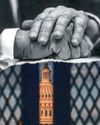
It's time for Trump's instincts to be called what they are: fascist
There is a good chance that on 5 November, Americans will elect the first fascist president of the United States.
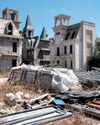
CASTLES IN THE AIR
It was meant to be a dream development of mansions in the Turkish hills. But 13 years on, Burj AI Babas is a half-built ghost town, and a microcosm of the scandal-hit construction sector under Erdoğan. Will the buyers ever get to move in?

Using cutting-edge methods, Alexandra Morton-Hayward is unravelling the mysteries of grey matter – even as hers betrays her The brain collector
ALEXANDRA MORTON-HAYWARD, a 35-year-old mortician turned molecular palaeontologist, had been behind the wheel of her rented Vauxhall for five hours, motoring across three countries, when a torrential storm broke loose on the plains of Belgium.
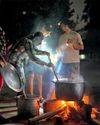
Dark times Blackouts spark fears of wider collapse
Maria Elena Cárdenas is 76 and lives in a municipal shelter on Amargura Street in Havana's colonial old town.

Washington Post sparks fury over decision not to endorse
Fury and shock ripped through liberal America last weekend after news that the Washington Post, home of the Watergate scandal exposé, will not endorse Kamala Harris for president.
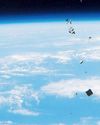
The great space waste
From chaotic collisions to depletion of the ozone layer, the thousands of satellites in orbit around Earth have the potential to wreak havoc

New heights Teen Sherpa's fight for climbing equality
Growing up as a sherpa in Nepal, Nima Rinji Sherpa was used to his relatives performing superhuman feats on the mountains.
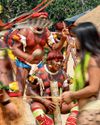
Plastic cave made in Spain keeps Amazonian culture alive
It is not yet dawn in Ulupuwene, an Indigenous village in the Brazilian Amazon, but the Wauja people have already risen to prepare for the festive day ahead.